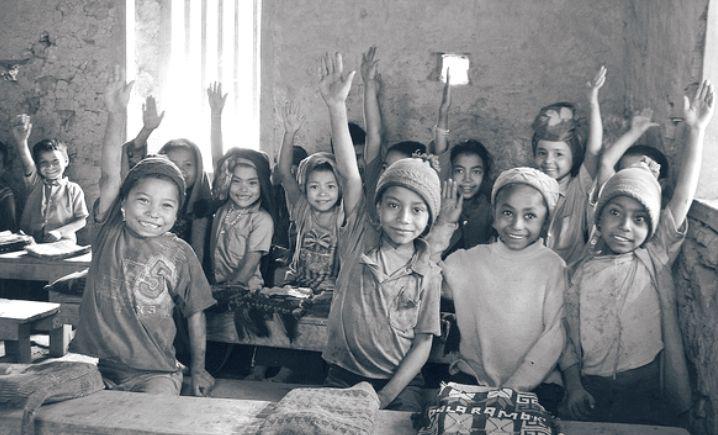学生以食为本
2013-08-19BenThompson
Ben Thompson
epal is one of the hilliest countries in the world. Most of the population live in remote areas, hours from the nearest town or shop. Farmers have to cut in to the hillside to make fields. Growing enough food to live on is a real challenge.
尼泊尔是世界上最多山的国家之一,大多数尼泊尔人住在偏僻山区,离最近的城镇或商店有好几个小时的路程。山里的农民需要开山获取农田。对他们来说,靠种粮食来养活自己不是一件容易的事。
“Education brings miracles wherever it goes,” sing the children. Those who were unable to get education before are now able to get education because of*school meals. Many of these children come to school on an empty stomach.
Teacher: Good morning.
Students: Good morning, sir. Teacher: Sit down.
Students: Thank you, sir.
This is 12-year-old Hamah. Shes having her science class. Up to 30 children sit crammed onto wooden benches in tiny classrooms. Theyve got four hours of lessons before they get their school lunch.
The food is grown here in Nepal, and begins its journey in the south in the fertile Terai region. Its transported in trucks along dusty winding roads. The United Nations World Food Program have been delivering sacks of food to schools in this area for the past 16 years. Its a difficult and dangerous job. It takes two days of non-stop driving.
Ninety-five thousand children in this part of Nepal need a school lunch each day, so its all hooves on deck for the last part of the journey. Each mule carries four sacks of food. It takes another three days of trekking just to reach the schools.
“教育给所到之处带来奇迹,”孩子们在歌中唱道。这些从前不能上学的孩子们由于有了学校营养餐,现在有了受教育的机会。他们当中的许多人每天是饿着肚子来上学的。
老师:早上好。
众学生:老师,早上好。老师:坐下。
众学生:谢谢老师。
这位是12岁的哈玛,她正在上科学课。小小的课室里三十名学生挤坐在长木凳上,他们要先上四个小时的课才可以吃上学校提供的营养餐。
学校营养餐的食物产自尼泊尔本土,它的行程从尼泊尔南部富庶的台拉地区开始,满载粮食的卡车沿着尘土飞扬的蜿蜒公路行驶。联合国世界粮食计划署给这个地区的学校运送粮食已经有16年了,这是一项艰苦且非常危险的工作,车需要连续行驶整整两天。
在尼泊尔的这个地区,有九万五千个孩子每天都需要吃上一顿学校营养餐,现在骡子都准备好走最后的一程了。每只骡子都要驮四袋粮食,长途跋涉走上三天才能到达学校。
Each sack contains a cereal mixed with 18 extra vitamins and minerals. It gets mixed together with a type of fat called “Ghee.” Its heated over a smokey fire in the school kitchen.
The malnutrition rate amongst children in Nepal is high at 41%. But in hill areas like this, its far worse at 60%. For many of these kids, the school lunch is the only proper meal theyll get all day.
Girl: (via translator) Sometimes Im so hungry I want to go home, but I stay for my school lunch. Reporter: So, for you, why is the food so important when you come to school?
Hamah: (via translator) I like the school meals very much. It helps me concentrate in class. Im really happy to get a meal at school. If I didnt get a school meal, I wouldnt be coming to school.
After school, Hamah sits with her Dad as he makes supper. He uses cooking oil thats given to Hamah if she achieves 80% attendance at school. Its part of a world food programme incentive to keep girls in education.
每个袋里装的是混合了18种维生素与矿物质的谷类食物,这些东西与一种叫“酥油”的脂肪混在一起,然后在学校厨房冒着黑烟的火上加热。
在尼泊尔,孩子的营养不良率为41%,但在像这样的山区,比例高达60%。对这些孩子当中的许多人来说,在学校吃的这顿营养餐是他们一天里可以吃到的真正的一餐。
女孩:(通过翻译)有的时候我太饿了,我都想回家了,但我还是留下来,因为想吃学校的午餐。
记者:为什么食物对你来上学这么重要呢?
哈玛:(通过翻译)我很喜欢学校的这一餐,它可以帮助我在课堂上集中精神。可以在学校吃到一餐,我很开心。如果不是因为有学校营养餐,我就不会来上学了。
放学后,哈玛陪坐在父亲身边,他正在做晚餐。他用的食用油是哈玛带回来的,如果她在学校的出勤率达到80%,她就可以拿到这些油。这是世界粮食计划署项目的一部分,目的就是用这种激励方式让女孩子可以继续接受教育。
Father: (via translator) As long as I can, I will try to educate Hamah. If things get really hard, she might have to stop going to school and work in the fields instead.
And thats the case for most of these families. For many, the only thing that persuades parents to keep their children in school is knowing theyll get at least one good meal a day.
Teacher: (via translator) If there were no school meals, there wouldnt be many children at school. Theyd go to work in the hills. When I started work here there were only 22 students. Now there are 170 because of school meals.
The cooking oil scheme has had a massive impact too. Before, there were no girls at this school. Now there are 87.
Its a slow process, but the hope is that, in the long run, it will enable families, like Hamahs, to grow enough food to eat, some extra to sell, and, eventually, support themselves.
父亲:(通过翻译)只要我有这个能力,我就会让哈玛上学。但如果情况实在不好,她可能就得辍学,到地里干活。
这里的大多数家庭都面临这种局面。对许多家庭来说,家长让孩子继续上学的惟一原因是知道孩子一天至少可以在学校吃上一顿好的。
老师:(通过翻译)如果没有学校营养餐,来上学的学生就不会有这么多,孩子们会到山上劳作。我刚来这里教书时,学校里只有22名学生;现在因为有了学校营养餐,学生增加到170名。
联合国的食用油计划影响力也非常大。这所学校以前是没有女学生的,现在有87名之多。
这一切是一个缓慢的过程,但从长远看,希望这个计划能让像哈玛这样的家庭自己种植的粮食可以够自己吃,还能有一些盈余卖出去,渐渐地,他们可以自给自足。
文化交流站
学校营养餐
由联合国世界粮食计划署开展的学校营养餐(School Meals)是一个全球性的项目,在发展中国家开展营养餐项目已经有50年的时间。根据调查显示,约有3.68亿儿童——几乎是5名儿童当中就有一名——在169个发展中国家和发达国家中接受学校营养餐的援助。学校营养餐在全世界获得的捐款总额已达750亿美元,其中大部分来自各国政府拨款。
在2012年,世界粮食计划署为63个国家中的2470万儿童提供营养餐或零食,同时为130万女童和50万男孩提供带回家的口粮——以此方式对家境贫寒,但仍送子女接受教育的家庭鼓励,而不是盲目地指派这些家庭去农田、工厂或在家做工以获得收入。
从2009年开始,世界粮食计划署开始在尼泊尔启动新项目,每月向女孩上学出勤率高的家庭提供两升的食用油,旨在提高女孩子的入学率。
